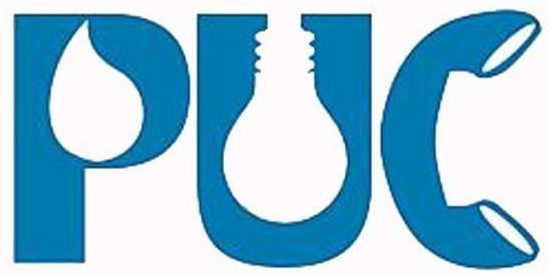Public Utilities Commission
The Public Utilities Commission (PUC) is a corporate body which was established by virtue of the Public Utilities Commission Act No. 26 of 1990 which was assented to by the then President of Guyana, His Excellency Hugh Desmond Hoyte, on December 31, 1990. It is the independent regulator for the water, electricity and telecommunications sectors in Guyana.
The Commission, which became operational in March 1991, is tasked with the responsibility of ensuring that the service providers in Guyana deliver services that meet the standards as enshrined in the relevant Acts and Regulations. The monitoring of the quality of services; the imposition of rates for services that are fair and reasonable without negatively impacting the financial viability of the companies; the conduct of investigations into the operations of the service providers; and compliance with the Orders of the Commission represent the key functions of the Commission. The Commission is empowered to impose consequential penalties should there be any breach on the part of the operators.
The PUC Act of 1990 was subsequently repealed by the Public Utilities Commission Act No. 10 of 1999, which was promulgated primarily to facilitate the reforms of the electricity sector, bringing into effect the Electricity Sector Reform Act No. 11 of 1999. The Commission thus assumed the dual responsibility of regulating both the electricity and telecommunications sectors.
Following the merger of the Georgetown Sewerage and Water Commission and the Guyana Water Authority in 2002, the Guyana Water Incorporated (GWI) was established and was brought under the purview of the Commission in 2003 by virtue of Order 26 of 2003.
Telecommunications Sector
The issuance of the Telecommunications Act No. 27 of 1990 followed the PUC Act of 1990.
The first utility to be privatized was the then Guyana Telecommunications Corporation (GTC). The American-based Atlantic Tele-Network Inc. (ATN) was awarded the Government tender and it purchased 80% of the shares in the company, with the Government retaining 20%. The Agreement which was entered into between the Government and ATN was inked on June 18, 1990 leading to the formation of the Guyana Telephone and Telegraph Company (GT&T) whose licence was granted on December 19, 1990. The licence was granted for a period of 20 years with an option to renew clause. GT&T was brought under the Commission’s purview and commenced its operations on January 28, 1991.
In February 2006, U-Mobile (Cellular) Inc., trading as Digicel, was introduced to the local telecoms industry after acquiring Cel*Star (Guyana) Inc. It began its operations under the terms and conditions of the licence granted to Cel*Star in February 2001, primarily offering mobile telecommunications services.
Following the liberalization of the telecommunications sector in October 2020, E-Networks Inc. was established as a new player in the sector. New licences were issued to the telecommunications undertakings that allow for the installation, operation, and provision of both fixed and mobile telecommunications services. Post-2020, licences were issued to two (2) additional telecommunications undertakings: Green Gibraltar Inc. in January 2022 and Quark Communications Inc. in July 2023, both of whom have yet to establish a significant presence in the sector.
Electricity Sector
On October 1, 1999, the Government divested 50% of its shares in the then Guyana Electricity Corporation (GEC) to the UK based Group, Commonwealth Development Corporation (CDC) of the United Kingdom and the Electricity Supply Board International of Ireland (ESBI). The companies were also granted the management contract to manage the new company – Guyana Power & Light Inc. (GPL). The Electricity Sector Reform Act (ESRA) No. 11 of 1999 was issued in October 1999 and its Licence which was made effective October 1, 1999 bring the company under the purview of the PUC.
The repealing of the 1990 PUC Act and the promulgation of the PUC Act 1999 coincided with the ESRA 1999 and the raft of Schedules, which saw the implementation of various reforms aimed at improving the efficiency and reliability of the electricity supply in Guyana. While the PUC has general regulatory oversight of the power company, its functions are limited with respect to some aspects of the company’s operations, for instance, rates, which are set by a formula in GPL’s licence. In 2010, the ESRA was amended to provide for the annual submission by GPL its Operating Standards and Performance Targets (OSPT) to the Commission for review.
Water Sector
The water and sewerage services were divided into two separate entities: The Georgetown Sewerage & Water Commission (GS&WC), which provided Central Georgetown with water and sewerage services; while the Guyana Water Authority (GUYWA) was responsible for delivering water to suburban, rural, hinterland and areas related to the Sugar Labour Welfare Fund.
As a result of the merger between Georgetown Sewerage and Water Commission and the Guyana Water Authority in 2002, the Guyana Water Incorporated (GWI) was established and the Water and Sewerage Act No. 5 of 2002 was assented to on May 28 of the said year. The management contract and licence for the operations of GWI were granted to Severn Trent Water International (STWI), a UK management company on November 13, 2002, to manage the company and to reform the water sector. This partnership failed in 2007, and Government was once more vested with the control of the water and sewerage sectors.
The GWI came under the purview of the PUC in 2003 by virtue of Order 26 of 2003 (Water & Sewerage Rates and Quality of Service Order). The Commission’s responsibilities with respect to the water sector include regulating tariffs, monitoring the quality of service provided by the water company, and in compliance with the World Health Organization (WHO) standards the provision for access to safe and potable water for all citizens of Guyana.

